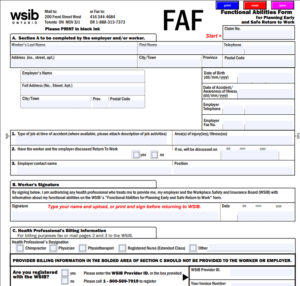Effective case management is a vital component of providing comprehensive support to individuals with disabilities, ensuring that they receive the necessary services, accommodations, and advocacy to return to work and to lead fulfilling lives.
Disability managers play a pivotal role in this process, and their success hinges on a set of best practices that encompass professional expertise, ethical considerations, and robust communication.
By adopting a client-centered approach, honing their communication skills, and staying abreast of relevant legislation and medical knowledge, disability managers can create a positive impact on the lives of those they serve.
Client-Centered Approach
Disability managers should adopt a client-centered approach, where the individual with a disability is actively involved in the decision-making process. This approach considers the unique needs, goals, and preferences of each person, ensuring that services and supports are tailored to their specific situation.
Assessment and Planning
Conduct thorough assessments to understand the client’s disability, limitations, and needs. Develop a comprehensive care or support plan that outlines specific goals, objectives, and timelines for achieving desired outcomes. Regularly review and update the plan as necessary.
Coordination of Services
Disability managers should serve as the central point of contact for clients, helping them access various services and resources, such as rehabilitative intervention and vocational support. Coordinating these services can streamline the process and improve outcomes.
Knowledge of Legislation
Stay up-to-date with Canadian disability-related legislation, including the Canadian Charter of Rights and Freedoms, the Accessibility for Ontarians with Disabilities Act (AODA), Privacy legislations and provincial or territorial disability support programs. Understanding these laws is essential for guiding clients through the legal framework.
Cultural Sensitivity
Be culturally sensitive and respectful of the diverse backgrounds and experiences of clients. Recognize that different cultural groups may have unique perspectives on disability and support services.
Communication Skills
Effective communication is key to building trust and understanding with clients. Disability managers should be skilled at active listening, providing clear explanations, and maintaining open lines of communication with clients and their families.
Documentation and Record Keeping
Maintain accurate and organized records of client assessments, plans, and progress. This documentation can help track outcomes, support funding, and provide evidence in case of disputes or appeals.
Collaboration
Building a strong network of professionals can help address various aspects of a client’s needs.
Continuous Professional Development
Stay updated on best practices, emerging trends, and advancements in disability management by participating in relevant training and continuing education programs.
Empowerment and Education
Empower clients with disabilities by providing them with information and resources to make informed decisions about their lives. Offer education and training programs to enhance their independence, functional potential and self-sufficiency.
Evaluation and Feedback
Regularly evaluate the effectiveness of the case management strategies employed and seek feedback from clients. Adjust the approach as needed to improve outcomes.
BEST PRACTICES
Best practices for disability managers involve a combination of professional skills, ethical considerations, and effective communication. These practices are essential for ensuring the well-being and empowerment of individuals with disabilities.
Client-Centered Approach
- Assessment: Conduct comprehensive assessments of each client’s disability, strengths, limitations, and specific needs.
- Individualized plans: Develop personalized care or support plans that are tailored to each client’s unique circumstances, preferences, and goals.
- Empowerment: Encourage clients to actively participate in decision-making regarding their care and services, respecting their autonomy and choices.
Effective Communication
- Active Listening: Practice active listening to understand clients’ concerns, fears, and aspirations fully.
- Clear and Transparent Communication: Use clear and jargon-free language to explain processes, rights, and services.
- Open Lines of Communication: Ensure that clients can easily reach out for assistance or clarification when needed.
Knowledge and Expertise
- Legislation and Regulations: Stay well-informed about disability-related laws, regulations, and policies at the federal, provincial, and territorial levels.
- Medical and Rehabilitation Knowledge: Maintain a working knowledge of medical and rehabilitation practices related to different disabilities.
- Cultural Competency: Be culturally sensitive and aware of diverse perspectives on disability and support services.
Documentation and Record Keeping
- Accurate and Organized Records: Keep accurate and organized records of client assessments, plans, progress, and communications.
- Privacy and Confidentiality: Adhere to strict confidentiality standards when handling sensitive client information.
Collaboration
- Interdisciplinary Collaboration: Collaborate with healthcare providers, social workers, educators, and other professionals to address various aspects of a client’s needs.
- Networking: Build and maintain a strong network of professionals and organizations for referrals and information sharing.
Continuous Professional Development
- Training and Education: Engage in ongoing training and education to stay updated on best practices, emerging trends, and advancements in disability management.
- Certifications: Pursue relevant certifications and professional development opportunities to enhance skills.
Empowerment and Education
- Information Sharing: Provide clients with information and resources to help them make informed decisions about their lives.
- Life Skills Training: Offer education and training programs that promote independence, self-sufficiency, and skill development.
Evaluation and Feedback
- Outcome Evaluation: Regularly assess the effectiveness of case management strategies and interventions by tracking client progress toward goals.
- Client Feedback: Seek feedback from clients to improve services continually.
Crisis Intervention
- Emergency Response: Develop protocols for handling crisis situations and providing immediate support to clients in distress.
- Safety Planning: Assist clients in developing safety plans when necessary to mitigate risks.
Ethical Considerations
- Ethical Standards: Adhere to a strong code of ethics that prioritizes client well-being, autonomy, and dignity.
- Conflict of Interest: Avoid conflicts of interest and maintain objectivity in decision-making.
Cultural Sensitivity and Inclusivity
- Accessibility: Ensure that services are accessible to individuals with diverse disabilities, including those from different cultural backgrounds.
- Inclusivity: Promote an inclusive environment where clients feel respected, valued, and included.
Technology Integration
- Utilize Technology: Incorporate technology tools and platforms to streamline case management processes, enhance communication, and improve documentation.
The role of disability case managers is indispensable in ensuring that individuals with disabilities receive the support and resources they need to recover, return to work, and thrive.
By adhering to best practices, disability managers not only navigate the complexities of the disability support system effectively but also empower their clients to overcome challenges, achieve their goals, and lead fulfilling lives.
Through client-centered approaches, interdisciplinary collaboration, continuous professional development, and a commitment to ethical standards, disability managers serve as advocates, educators, and catalysts for positive change within the disability community.






